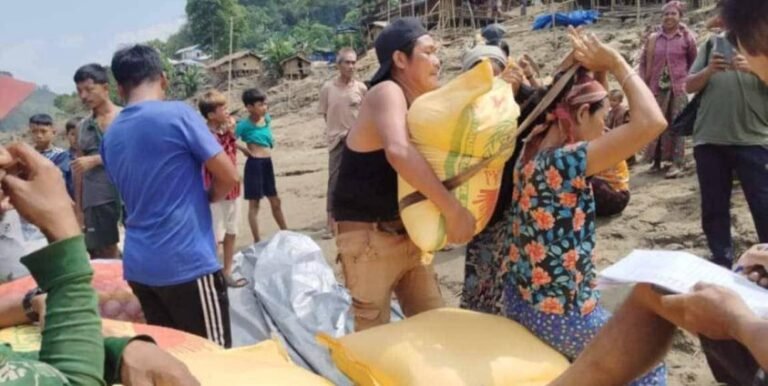Refugees from Paletwa Township in Chin State who faced floods where they were sheltering, in Lawngtlai District in India’s Mizoram State, have begun receiving aid.
2,283 Myanmar refugees from 472 households were sheltering in refugee camps in the three Lawngtlai District villages of Khaikhy, Twidin, and Longmasu. Heavy rain on 31 May and 1 June 2025 caused a river to break its banks and flood the three camps.
In total, the flooding swept away 91 Refugee shelters, affecting 729 refugees from 141 households and destroyed 112 toilets across the three refugee camps leaving the refugees in urgent need of assistance.
Just in the villages of Khaikhy and Twidin 670 Myanmar refugees were affected by the flooding when the floodwaters destroyed and swept away 87 of their shelters.
On 11 June 2025, the Paletwa IDPs and Humanitarian Support Group announced that food aid had been delivered to three camps in Lawngtlai District.
The group said that on 7 and 8 June, staple foods, including 130 bags of rice, cans of cooking oil, beans, and potatoes were distributed to Paletwa refugees sheltering in three refugee camps in the Lawngtlai District villages Khaikhy, Twidin, and Longmasu.
The head of the Paletwa IDPs and Humanitarian Support Group said to Khonumthung News: “Thanks to the cooperation of other organisations and donors, we were able to distribute this much aid. So, we kindly ask everyone to continue supporting us in providing essential help for ongoing humanitarian relief and reconstruction efforts.”
Though the refugees have started to receive aid they still need more supplies. These include: more food; medicine; wood, bamboo, and building materials to rebuild houses; water pipes; and buckets.
The cost for building a single new refugee shelter ranges from 20,000 to 25,000 Indian rupees (approximately 233 to 292 USD) and new toilets cost 2,500 to 3,000 rupees each (approximately 29 to 35 USD).
The Paletwa IDPs and Humanitarian Support Group has urged local and international donors and aid organisations to continue supporting the Paletwa refugees in Mizoram.


